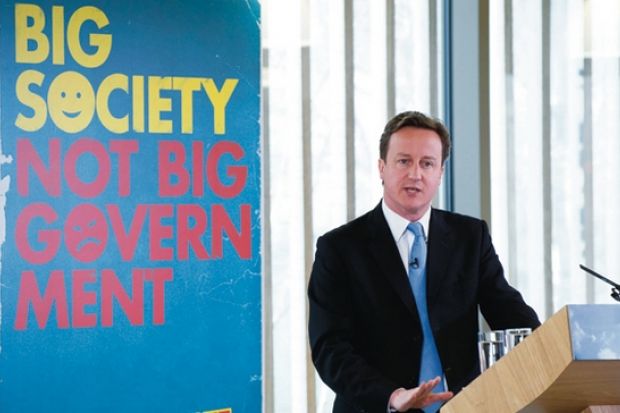Big idea: Critics say the AHRC is trying to please David Cameron’s government
Academics have begun a mass email campaign to try to persuade the Arts and Humanities Research Council to remove references to the Conservative Party’s “Big Society” agenda from its delivery plan.
The move follows a claim in The Observer newspaper that the council’s latest funding settlement was dependent on its agreement to fund research into the Big Society.
The AHRC rejected the allegation, pointing out that the cross-council Connected Communities programme, whose relevance to the Big Society is highlighted in its delivery plan, was devised before David Cameron’s pet policy was launched.
However, a petition to “remove the ‘Big Society’ as one of its six strategic areas for research funding” had attracted 2,700 signatures as Times Higher Education went to press.
“Research councils should not direct funding to strategic areas which overlap with any political party’s slogans,” the petition says.
Its originator, Thom Brooks, reader in political and legal philosophy at Newcastle University, is now urging signatories to email Rick Rylance, chief executive of the AHRC, directly.
He said further action would also be considered if Professor Rylance did not remove all references to the Big Society from the funding council’s documents.
He said it would be “worrying” if the AHRC had chosen to mention the Big Society in the hope of securing a better funding settlement.
“It would mean that the government would not need to exert any pressure…because the AHRC would choose to steer in its direction anyway,” he said.
He also doubted that politicians were “so shallow that the mention of this phrase will make them more likely to fund the arts and humanities in this age of austerity”.
In a letter to The Observer this week, a group of 188 academics said they were “appalled” that the AHRC “intends to promote” research on the Big Society: “That the AHRC has (apparently) volunteered to do this is all the more craven.”
In a statement on the matter, the AHRC says it does not have a dedicated budget to support Big Society research and notes that the Connected Communities scheme will receive only 1 per cent of the total AHRC budget in 2011-12.
The council also expresses its “unconditional support” for the Haldane principle.
“Expert peer review underpins funding decisions at the AHRC, and decisions are made on the basis of competitive excellence, not policy agendas,” it says.
But it adds that research should contribute to “the general good”. “The outcomes of research may or may not support the policy preferences of a particular administration, but we trust they aid the development of good, informed policy overall,” it says.
David Willetts, the minister for universities and science, denied in Parliament last week that there had been any “intervention from ministers” over the AHRC delivery plan.
He said it was “appropriate” for ministers to “ask research councils to consider how best they can contribute” to a government’s “key national strategic priorities”.
“But it is for the councils to decide on the specific projects and people to fund within these priorities,” he said.
Register to continue
Why register?
- Registration is free and only takes a moment
- Once registered, you can read 3 articles a month
- Sign up for our newsletter
Subscribe
Or subscribe for unlimited access to:
- Unlimited access to news, views, insights & reviews
- Digital editions
- Digital access to THE’s university and college rankings analysis
Already registered or a current subscriber? Login
